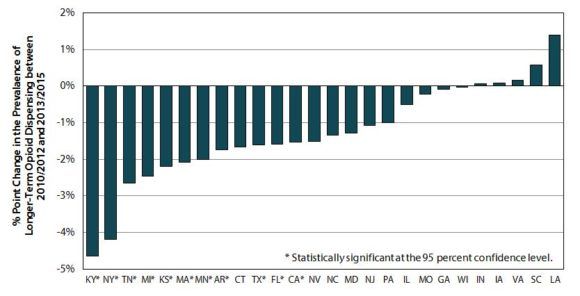

As states institute opioid policies to address the opioid epidemic, a new study has found considerable decreases in the prevalence of longer-term dispensing of opioids to injured workers in a number of states studied.
The study, Longer-Term Dispensing of Opioids, 4th Edition, by the Workers Compensation Research Institute (WCRI), examined trends of longer-term dispensing of opioids in 26 state workers’ compensation systems. It also documents how often the services such as drug testing, psychological evaluation and treatment recommended by treatment guidelines were used for managing chronic opioid therapy.
WCRI released this sample of the study’s findings:

“Research finds that high doses and prolonged use of opioids may lead to addiction, increased disability or work loss, and even death,” said Ramona Tanabe, WCRI’s executive vice president and counsel. “The information in this report can help policymakers and other stakeholders compare the trend of longer-term dispensing of opioids in their state to other states, and learn what policy tools are available to reduce unnecessary opioid use.”
This study used data comprising more than 400,000 nonsurgical workers’ compensation claims with more than seven days of lost time; more than two million prescriptions are associated with these claims from 26 states. These claims had injuries in 2010 and 2013 and received on average up to 24 months of medical treatment. The sample of claims in the study represents 36–69 percent of workers’ compensation claims in each state.
The 26 states in the study are Arkansas, California, Connecticut, Florida, Georgia, Illinois, Indiana, Iowa, Kansas, Kentucky, Louisiana, Maryland, Massachusetts, Michigan, Minnesota, Missouri, Nevada, New Jersey, New York, North Carolina, Pennsylvania, South Carolina, Tennessee, Texas, Virginia and Wisconsin.
The Workers Compensation Research Institute (WCRI) is an independent, not-for-profit research organization based in Cambridge, Mass. Its members include employers, insurers, governmental entities, managed care companies, health care providers, insurance regulators, state labor organizations and state administrative agencies in the U.S., Canada, Australia and New Zealand.